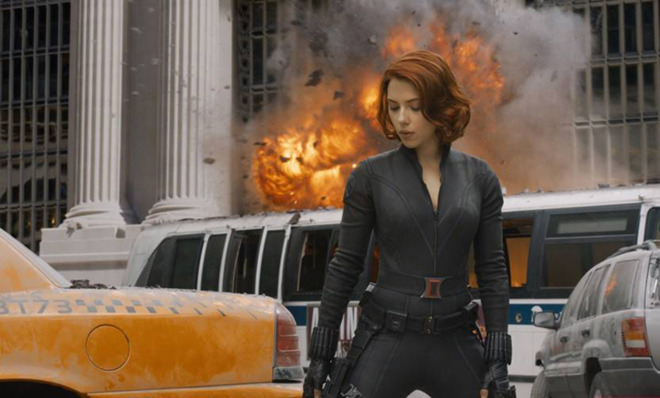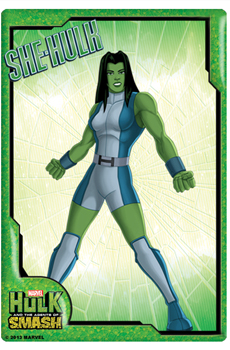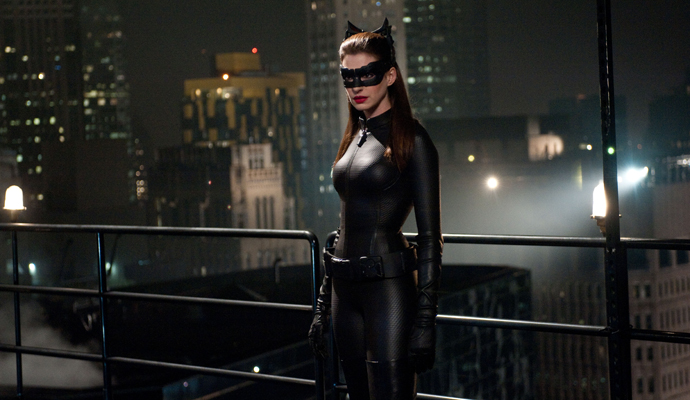Girls on Film: The superhero genre's 'giant green porn star' problem
Ignorant, sexist attitudes about female superheroes haven't changed — and until we demand it, they never will


A free daily email with the biggest news stories of the day – and the best features from TheWeek.com
You are now subscribed
Your newsletter sign-up was successful
During a discussion about superhero adaptations in the latest Scriptnotes podcast, host Craig Mazin and Man of Steel scribe David S. Goyer discussed the "attributes" of She-Hulk, who shares broadly similar powers with the Incredible Hulk. After Mazin described the superhero as "Slut-Hulk," and said she was made "just to appeal sexistly to 10-year-old boys," Goyer shared his own theory about the superhero, as transcribed by The Mary Sue:
"I have a theory about She-Hulk. Which was created by a man, right? And at the time in particular I think 95 percent of comic book readers were men and certainly almost all of the comic book writers were men. So the Hulk was this classic male power fantasy. [...] She-Hulk was the extension of the male power fantasy. So it's like if I'm going to be this geek who becomes the Hulk then let's create a giant green porn star that only the Hulk could f--k."
Goyer dug his hole even deeper when he was asked about adapting the Martian Manhunter, a longtime member of the Justice League, for film. Goyer said he would make the superhero a prisoner of Area 51, "then he gets out and he's really angry and he f--ks She-Hulk."

To begin with, She-Hulk wasn't made to be a "Slut-Hulk." The character was created during the success of The Incredible Hulk television series. Since the Bionic Man had already led to the Bionic Woman, Stan Lee wanted to introduce She-Hulk before the television series could create her.
The Week
Escape your echo chamber. Get the facts behind the news, plus analysis from multiple perspectives.

Sign up for The Week's Free Newsletters
From our morning news briefing to a weekly Good News Newsletter, get the best of The Week delivered directly to your inbox.
From our morning news briefing to a weekly Good News Newsletter, get the best of The Week delivered directly to your inbox.
She-Hulk, aka Jennifer Walters, is an attorney who was injured and required a blood transfusion from her cousin Bruce Banner, aka the Hulk. (Yes, cousin — not lover.) As a result, some of the Hulk's powers were transferred, and Walters became She-Hulk — a superhero with more control over her transformations. She ultimately chose to embrace her green form permanently, and has worked with most of Marvel's biggest superhero teams, including the Avengers and the Fantastic Four.
Of course, like every female superhero, She-Hulk has often been drawn as a busty powerhouse with little clothing, and is subject to male wish fulfillment. But she's also a feminist figure, and remains one of the most requested female superheroes for big-screen treatment. Her storylines have been described as "bluntly feminist" and "a metaphor for women and feminism."
And here we have one of Hollywood's most successful male screenwriters boiling her down to "a giant green porn star." This is particularly problematic coming from Goyer, who has been involved, in one way or another, with nearly a dozen comic-book adaptations. He's involved in the upcoming Batman v Superman: Dawn of Justice, and will write the upcoming Justice League movie. That means he is responsible for how audiences will finally see Wonder Woman on the big screen — even as he demonstrates his ignorance by casting another wildly popular female superhero as a sex object.
The female superhero problem isn't just one of reluctance and indifference — it's one of seriously skewed attitudes. The creative teams behind superhero franchises (and much of the media that report on them) simply don't treat female superheroes as superheroes. Instead, they're viewed as objects and used for male support.
A free daily email with the biggest news stories of the day – and the best features from TheWeek.com
In comics, She-Hulk has been written as an intellectual and member of the honor society the Order of the Coif, but you wouldn't know that from Goyer's comments. Scarlett Johansson, Anne Hathaway, and Emma Stone have portrayed powerful women in superhero movies, yet the media asks them about diets, underwear, and relationships. Female powerhouses like Black Widow, Mystique, and The Dark Knight Rises' Catwoman have been increasingly popular in supporting roles, but they never inspire spin-off solo projects like Wolverine has.

In an ideal world, female superheroes would embody all manner of power without being slotted into a narrow vein of sexiness, stilettos, and half-zipped zippers. But if that's ever going to happen, we'll need creatives who actually treat female superheroes with as much respect as their male counterparts.
Creatives also need to actually respect their audience. Superheroes are a mainstream phenomenon consumed by men and women; defining all comic-book geeks as male, sexless, and horny is totally inaccurate. Reducing one of the most admired female superheroes into a sex toy for male superheroes — or as Mazin says, "a Slut-Hulk" with "enormous boobs" — is not respecting the audience who admires her.
She-Hulk is a character who could helm a great feminist film. She's the level-headed counterpoint to the angst that surrounds many male heroes (and female characters in general). Where Bruce Banner is a man who can't control his emotions and explosive Hulk-bursts, Jennifer Walters is a woman who can. She is a hero who is empowered by her transformation, a refreshing contrast to just about every male hero out there, from the Hulk to Batman. She could be introduced in any number of Marvel's upcoming stories, since she's had many comic-book adventures with the characters currently in play.
But exploring that potential — and the potential of every other female superhero — will first require a big attitude adjustment. If we're stuck with female superhero movies by someone who thinks like David Goyer, why bother?
Girls on Film is a weekly column focusing on women and cinema. It can be found at TheWeek.com every Friday morning. And be sure to follow the Girls on Film Twitter feed for additional femme-con.
Monika Bartyzel is a freelance writer and creator of Girls on Film, a weekly look at femme-centric film news and concerns, now appearing at TheWeek.com. Her work has been published on sites including The Atlantic, Movies.com, Moviefone, Collider, and the now-defunct Cinematical, where she was a lead writer and assignment editor.
-
 Will increasing tensions with Iran boil over into war?
Will increasing tensions with Iran boil over into war?Today’s Big Question President Donald Trump has recently been threatening the country
-
 Corruption: The spy sheikh and the president
Corruption: The spy sheikh and the presidentFeature Trump is at the center of another scandal
-
 Putin’s shadow war
Putin’s shadow warFeature The Kremlin is waging a campaign of sabotage and subversion against Ukraine’s allies in the West
